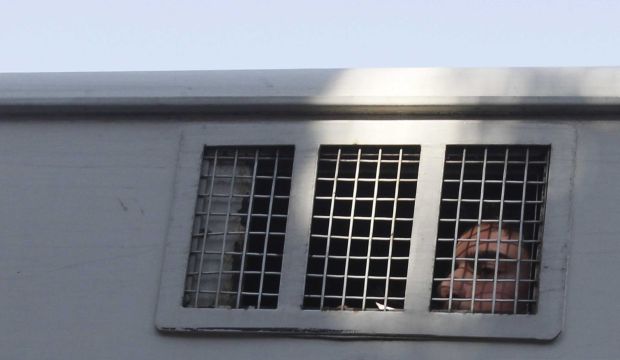
A Syrian detainee who was arrested over participation in the protests against Syrian President Bashar Al-Assad’s regime is seen in a prison vehicle at the Damascus police leadership building to sign his release papers on July 11, 2012. (Reuters)
Beirut, Asharq Al-Awsat—“We saw the document, but our hope remains strong. We cannot easily accept that my father was executed. Until we receive his corpse, we will not consider him dead,” the daughter of Kazahia Shahwan told Asharq Al-Awsat. Her father was just one of many Lebanese nationals who went missing in Syria after being detained by the government of former president Hafez Al-Assad.
The document she was referring to is a leaked Syrian government document that reveals that Shahwan, along with a number of other Lebanese nationals, was executed while being held in the infamous Syrian government-run Tadmor Prison in 1981 on charges of belonging to the Lebanese Phalanges Party and of taking part, along with an armed group, in the killing of 17 Syrian workers at the Shaka checkpoint.
The family continues to cling to hope more than 23 years later. They have lost faith in the efforts of Lebanese officials, who have failed to obtain any concrete word on Shahwan throughout their two-decade ordeal. Speaking to Asharq Al-Awsat following the release of the documents, Shahwan’s daughter said: “We are clinging to the news that my father was seen alive in prison after this document says he was executed.”
She also expressed regret that “none of the Lebanese officials have bothered to comment on the leaked documents.” The Syrian government denied arresting Shahwan in 1980, meaning that the leaked documents are the first documented confirmation that the Lebanese national was imprisoned in Syria.
Miss Shahwan said her family, and hundreds of other Lebanese families in situations like theirs, have had enough of the Lebanese government’s attitude regarding the Lebanese prisoners in Syria.
“We have grown weary of making desperate appeals, one after the other, to them over the past years. We have lost hope of them potentially taking responsibility for this file. We have begged everyone, but no one has taken our case—or our agony—seriously, she said.
The issue of Lebanese prisoners in Syria has been a diplomatic minefield between Beirut and Damascus since the early years of the Lebanese civil war of 1975–1990. Diplomatic ties between the two neighboring countries have vacillated over the years, notably including the formation of a joint committee to follow up claims of Lebanese prisoners being detained in Syria following Syria’s withdrawal from Lebanon in 2005. Despite all this, the issue remains a bone of contention between the two regional powers.
Civil organizations in Lebanon have registered the names of 622 Lebanese prisoners allegedly detained by the Syrian government. The Lebanese members of the joint committee have provided their Syrian counterparts with information and details about the prisoners but to no avail.
Speaking to Asharq Al-Awsat, head of the Lebanese Political Prisoners’ Association Ali Abu Dihn said: “We sent comprehensive data about the prisoners [to the authorities] . . . and submitted a unified list to Lebanese official bodies and the presidency of the Council of Ministers, which in turn submitted the names to the Syrian side.”
Abu Dihn added that despite the visits and meetings between the two sides, nothing tangible has resulted from the joint committee’s efforts. He said the Syrian side continued to deny all knowledge of the Lebanese prisoners, “presenting instead a list of 125 prisoners accused of theft, trafficking and murder.”
Abu Dihn, who is the author of a book documenting his 13-year imprisonment in Syria entitled A Returnee from Hell, said: “The leaked documents confirm our credibility . . . and our right to demand the release of the Lebanese people detained in Syrian prisons.”
He added: “Some of them [the Lebanese prisoners] are alive. We can confirm this because I and other Lebanese prisoners released from Syria met them during our incarceration, and we have also heard reports of them from other Syrian and Arab prisoners. Other prisoners have died, either executed or after many long years in prison.”
In exclusive comments to Asharq Al-Awsat, Ghazi Aad, who founded an organization called the Support of Lebanese in Detention and Exile, said he was not surprised at the content of the document. “It is the [Lebanese] government’s responsibility to move to provide official and verified information to the families,” he said.
Aad added that the families of the prisoners were “in a state of panic and fear . . . having seen these documents but still facing an absence of any official confirmation or response from the Lebanese authorities.”
The subject of the leaked Syrian documents published by Asharq Al-Awsat this week was raised in Lebanon’s parliament on Thursday, with Lebanese MPs calling for Beirut to contact the Damascus government and investigate the reports of Lebanese nationals held in Syrian prisoners.
This article is the first based on a series of leaked Syrian government documents Asharq Al-Awsat is publishing in cooperation with the Masarat Center and the Wathaiq Dimashq [Damascus Documents] website.
